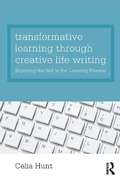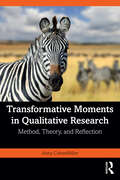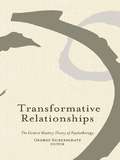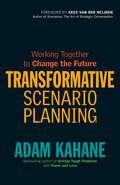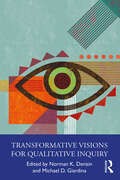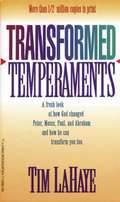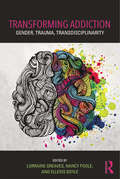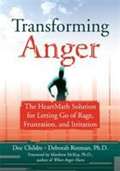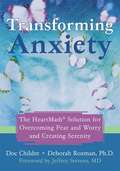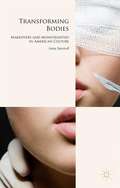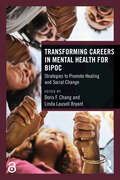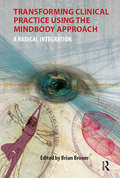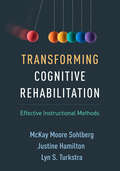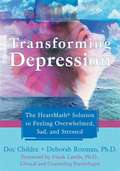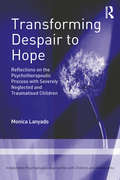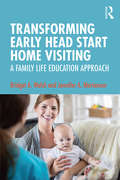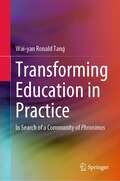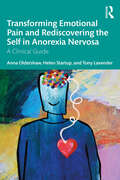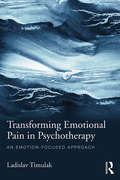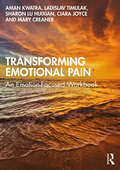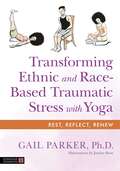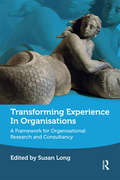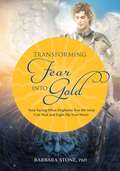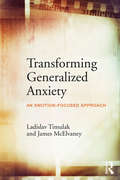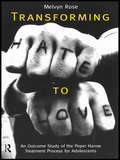- Table View
- List View
Transformative Learning through Creative Life Writing: Exploring the self in the learning process
by Celia HuntArising from a research project conducted over two years, Transformative Learning through Creative Life Writing examines the effects of fictional autobiography on adult learners’ sense of self. Starting from a teaching and learning perspective, Hunt draws together ideas from psychodynamic psychotherapy, literary and learning theory, and work in the cognitive and neurosciences of the self and consciousness, to argue that creative life writing undertaken in a supportive learning environment, alongside opportunities for critical reflection, has the power to transform the way people think and learn. It does this by opening them up to a more embodied self-experience, which increases their awareness of the source of their thinking in bodily feeling and enables them to develop a more reflexive approach to learning. Hunt locates this work within recent developments in the influential field of transformative learning. She also identifies it as a form of therapeutic education arguing, contrary to those who say that this approach leads to a diminished sense of self, that it can help people to develop a stronger sense of agency, whether for writing or learning or relations with others. Topics covered include: Creative writing as a tool for personal and professional development The transformative benefits and challenges of creative writing as a therapeutic activity The relationships between literary structures and the processes of thinking and feeling The role of cognitive-emotional learning in adult education Collaborative learning and the role of the group This book will interest teachers in adult, further and higher education who wish to use creative life writing as a tool for learning, as well as health care professionals seeking art-based techniques for use in their practice. It will also prove useful to academics interested in the relationship between education and psychotherapy, and in the theory and practice of transformative learning. Additionally, it will appeal to writers seeking a deeper understanding of the creative process.
Transformative Moments in Qualitative Research: Method, Theory, and Reflection
by Anna CohenMillerHave you ever wondered if through your research you could make the world a better place? Have you ever wanted to know more about how others conduct their research? In this groundbreaking book, Anna CohenMiller, multi-award- winning author and educational leader, eloquently fuses powerful stories of research with methodological insight and theory. Each chapter offers a clear, practical and engaging exploration of qualitative inquiry, emphasizing the power of research to foster equity, inclusion and justice-centered practice (e.g., social justice, economic justice, environmental/ ecological justice). Through a collection of captivating and thought-provoking stories from a diverse set of emerging and established scholars, the chapters inspire, challenge and empower readers to consider their own work and practice from research design, to fieldwork, analysis and interpretation, to sharing findings and coalition building and advocacy. The nuanced approach of this accessible text tackles complex issues, inviting readers to reflect on their own research practice and embrace transformative learning, shining a light on the work and experiences of marginalized communities often overlooked in academic discourse. In bringing together creative storytelling modes and methods, such as poetic inquiry, dialogic conversations and reflections across decolonial practice, Indigenous research, participatory youth action research and ecopedagogy, the stories provide a rich tapestry of experiences and perspectives. This book is an invaluable resource and testament to the profound impact of qualitative research for graduate students, practitioners and researchers to enhance their research and praxis. It will appeal to audiences across disciplinary backgrounds including social sciences, educational sciences, humanities and STEM and health fields, encouraging us to embrace the power of research to shape a more inclusive and just world by creating positive change within ourselves, our practice and our research.
Transformative Relationships: The Control Mastery Theory of Psychotherapy
by George SilberschatzThe control-mastery theory, developed by Dr. Joseph Weiss over the second half of the twentieth century, is an attempt to integrate an understanding of how the mind works, how psychopathologies develop, and how psychotherapy can effectively help. Control-Mastery theory assumes that the patient's problems are rooted in the grim, constricting pathogenic beliefs that the patient acquires in the traumatic experiences of childhood. The driving force behind the psychotherapeutic process is the patient's conscious and unconscious desire to recover the capacity to pursue life goals by gaining control and mastering self destructive patterns of thoughts and behaviors. Underlying this theory is the conception that the client structures (both consciously and unconsciously) the psychotherapeutic process in order to clearly and quickly address her own goals. Following this line of thought, the practitioner must be able to identify a client's aims, respond to and encourage these thoughts, and develop a strategic therapeutic plan to effectively address the needs and wants of each individual. This book aims to present the control-mastery theory in a more accessible format, and introduce it to a wider audience, expanding the scope of the theory beyond simply a comparison to Freudian analysis. The text presents an integrated cognitive-psychodynamic-relational approach to therapy, addressing issues surrounding psychopathology and pathogenic constructions. Organized into three distinct sections, the book first considers theoretical underpinnings before moving into in-depth discussions of clinical and practical application of these valuable therapeutic tools and techniques, drawing heavily on detailed descriptions of entire therapy sessions. The final section of the book covers current and developing empirical research, presenting convincing arguments in support of the theory and practice earlier discussed. The editor has extensive research and clinical experience with both the conceptual and practical aspects of the theory, and has worked with Joseph Weiss and Hal Sampson - the two pioneers of the control-mastery approach - who each contributes a chapter to the book. Transformative Relationships advances this integrative approach to therapy beyond its current scope, introducing these valuable concepts and techniques to a wider audience of practitioners of all backgrounds.
Transformative Scenario Planning: Working Together to Change the Future
by Adam Kahane&“Take[s] scenario planning to a new level, beyond the confines of business strategy, to deal with wider social and economic issues.&”—Vince Cable, former Secretary of State for Business, UK People who are trying to solve tough economic, social, and environmental problems often find themselves frustratingly stuck. They can&’t solve their problems in their current context, which is too unstable or unfair or unsustainable. They can&’t transform this context on their own—it&’s too complex to be grasped or shifted by any one person or organization or sector. And the people whose cooperation they need don&’t understand, agree with, or trust them…or each other. Transformative scenario planning is a powerful new methodology for dealing with these challenges. It enables us to transform ourselves and our relationships and thereby the systems of which we are a part. At a time when divisions within and among societies are causing so many people to get stuck and to suffer, it offers hope—and a proven approach—for moving forward together. Praise for Adam Kahane&’s books &“Thought-provoking discourse on handling difficult situations.&”—Publishers Weekly &“Profound . . . a wise way to negotiate our toughest group, community, and societal challenges.&”—William Ury, New York Times–bestselling coauthor of Getting to Yes
Transformative Visions for Qualitative Inquiry (International Congress of Qualitative Inquiry Series)
by Norman K. Denzin Michael D. GiardinaTransformative Visions for Qualitative Inquiry takes as its central theme the idea of transformation, transformative action, transformative possibilities, and potentialities for the future for qualitative inquiry. In a present moment defined by a pandemic of meanings over COVID-19, climate change, political upheaval, inequality, and oppression of all kinds, contributors to this volume seek a new way forward—to reimagine a post-pandemic pedagogy of hope and compassion both for qualitative research and for the communities in which we inhabit. Empathy. Healing. Collaboration. Survival. Discomfort. Protection. Justice. Creative agency. The arts. These are the watchwords for the road ahead. In these uncertain times, leading international scholars from the United States, Canada, and Australia look ahead with a renewed sense of hope, but remain grounded in the reality that much work lies ahead—that our inquiry must meet the demands of our hopeful but evolving future. More specifically, contributors focus on such topics as: academic healing; environmental justice; the hegemony of higher education and challenges to critical education; arts-based research such as songwriting, participatory workshops, and autopoetics; disruptions to conventional humanist and Western modes of thought; and questions of empathy and spirit-writing. Transformative Visions for Qualitative Inquiry is a must-read for faculty and students alike who are interested in imagining new ways to restore healing from the pandemic—to push back, resist, heal, share, laugh, and live.
Transformed Temperaments
by Tim LaHayeAn analysis of Abraham, Moses, Peter, and Paul, whose strengths and weaknesses were made effective when transformed by God.
Transforming Addiction: Gender, Trauma, Transdisciplinarity
by Lorraine Greaves Nancy Poole Ellexis BoyleChoice Highly Recommended Read Addiction is a complex problem that requires more nuanced responses. Transforming Addiction advances addictions research and treatment by promoting transdisciplinary collaboration, the integration of sex and gender, and issues of trauma and mental health. The authors demonstrate these shifts and offer a range of tools, methods, and strategies for responding to the complex factors and forces that produce and shape addiction. In addition to providing practical examples of innovation from a range of perspectives, the contributors demonstrate how addiction spans biological, social, environmental, and economic realms. Transforming Addiction is a call to action, and represents some of the most provocative ways of thinking about addiction research, treatment, and policy in the contemporary era.
Transforming Anger: The Heartmath Solution for Letting Go of Rage, Frustration, and Irritation
by Doc Childre Deborah RozmanFrom the leaders of the renowned HeartMath Institute comes the first anger book to use scientifically proven techniques to transform the body's physical response to anger and show readers how to release and resist angry feelings.
Transforming Anxiety: The HeartMath® Solution for Overcoming Fear and Worry and Creating Serenity
by Doc Childre Deborah RozmanFrom the best-selling authors of Transforming Anger and Transforming Stress comes the first book to apply scientifically proven techniques for engaging with the heart to promote fast and effective relief from anxiety.
Transforming Bodies
by Heike SteinhoffAt the turn of the twenty-first century, American media abound with images and narratives of bodily transformations. Transforming Bodies investigates how these representations have become key sites for the negotiation of power. Focusing on the representations of 'extreme' forms of somatic transformations, particularly cosmetic surgery, this book examines iconic popular cultural texts from diverse media and genres. The reality TV show The Swan, the TV drama series Nip/Tuck, Chuck Palahniuk's(post-)postmodern novels Invisible Monsters and Invisible Monsters Remix, and Scott Westerfeld's young adult fiction series Uglies are read as expressions of the heterogeneous biopolitical discourses that are articulated in the American mediascape. In contemporary American culture, representations of body transformations are often part of a makeover paradigm that presents bodies as 'beautiful,' 'individual' and 'improved' if they adhere to normative constructions of gender, sexuality, class, race/ethnicity, and able-bodiedness. However, Transforming Bodies demonstrates that a number of popular cultural texts take up narrative structures, representational strategies and ideological underpinnings of makeover culture in order to re-write them. These texts link makeovers to images, practices, and narratives of monstrosity and thereby challenge cultural norms. At the crossroads of American, cultural, literary, media, gender, queer, disability and governmentality studies, the book presentsa timely intervention into critical debates on body transformations and contemporary makeover culture.
Transforming Careers in Mental Health for BIPOC: Strategies to Promote Healing and Social Change
by Doris F. Chang Linda Lausell BryantThis book provides targeted advice to Black, Indigenous, and People of Color (BIPOC) in the mental health professions on how to navigate, resist, and transform institutions and policies that were not designed for them.A diverse team of BIPOC leaders reveal their experiences of race-related stress and how they draw on cultural strengths and anti-oppressive frameworks to create more inclusive, equitable, and culturally affirming approaches to mental health training, research, and practice. This book illustrates how it is possible for BIPOC students and professionals to have a career that is more sustainable, allows authenticity to emerge, and sparks transformative change in clients, students, organizations, and society. It addresses the unique professional development needs of BIPOC individuals across different career stages and professional roles. Covering topics such as how to respond to microaggressions from patients, become a media contributor, or step into organizational leadership, each core chapter includes a discussion of the pertinent literature, culturally grounded theories, personal reflections, and actionable strategies for community healing and social change.This essential guide will inspire trainees, practitioners, educators, and administrators in the fields of social work, psychology, counseling, psychiatry, education, and public health, to envision a path toward a more culturally affirming and transformative career.The introduction, chapter 1, and chapter 25 of this book are freely available as downloadable Open Access PDF’s at http://www.taylorfrancis.com.
Transforming Clinical Practice Using the MindBody Approach: A Radical Integration
by Brian BroomThis book assumes that it is no longer tenable to work in healthcare without considering the person as a whole being constituted by a rich weaving of mind, body, culture, family, spirit and ecology. The MindBody approach embraces this 'whole.' But how does it transform clinical practice and training for the clinician and treatment for the patient/client? The book collects together the experiences from a diverse range of clinical practitioners (including psychotherapy, specialist medicine, general practice, physiotherapy, occupational therapy, dietetics, , nursing, and complementary and alternative medicine practitioners) who have deliberately chosen to integrate a MindBody philosophy and skill set in their clinical practices. All reflect deeply on their unique journeys in transforming their clinical encounters. Most have been trained in the dominant Western framework and have inherited the classical dualistic approach which typically keeps mind and body apart.
Transforming Cognitive Rehabilitation: Effective Instructional Methods
by McKay Moore Sohlberg Justine Hamilton Lyn S. TurkstraGrounded in cutting-edge knowledge about cognitive function and recovery from brain injury, this practical reference and text builds on the authors' influential earlier work, Optimizing Cognitive Rehabilitation. It incorporates major advances in the field to provide a new framework for assessing patients and developing individualized rehabilitation plans. The distinguished authors present principles and procedures for promoting engagement, teaching cognitive strategies and discrete facts and routines, introducing external cognitive aids, and supporting patients' social competence. Additional topics include considerations for using computer-based training, managing functional cognitive symptoms, and providing cognitive rehabilitation in the inpatient setting. The book features detailed case illustrations and filled-out examples of 19 reproducible planning and progress monitoring forms. Blank forms can be downloaded and printed in a convenient 8 1/2" x 11" size.
Transforming Depression: The Heartmath Solution To Feeling Overwhelmed, Sad, And Stressed
by Frank Lawlis Doc Childre Deborah RozmanThis latest offering from the Institute of HeartMath shows readers how to use the revolutionary HeartMath(r) tools like the Freeze-Framer(r) and the Heart Lock-In(r) to overcome feelings of sadness and depression associated with stress and the sense of being overwhelmed by the chaotic world in which we live.
Transforming Despair to Hope: Reflections on the Psychotherapeutic Process with Severely Neglected and Traumatised Children
by Monica LanyadoTransforming Despair to Hope: Reflections on the Psychotherapeutic Process with Severely Neglected and Traumatised Children offers a thorough overview of the problems and rewards of trying to help severely neglected and traumatised children. Drawing on over 40 cyears of clinical experience, Monica Lanyado provides a historical and social perspective on this challenging population, as well as helpful theoretical frameworks and thoughtful support for all professionals and clinicians working with these children. This book brings together selected past writings and new chapters from Lanyando. In it she describes the consequences of severe neglect and trauma on a child’s emotional development, and then goes on to examine what it is that brings about positive change. By using vivid clinical examples of therapeutic practice with these children, she elucidates the difficulties associated with this population, as well as for those who care for them in families and in residential settings. Transforming Despair to Hope is a valuable resource for child and adolescent mental health professionals and trainee clinicians, as well as those in related fields working with children in need.
Transforming Early Head Start Home Visiting: A Family Life Education Approach
by Bridget A. Walsh Jennifer A. MortensenResearch on home visiting shows that Early Head Start (EHS) home-based programs benefit from additional training and resources that streamline philosophy and content. In this essential guide, Walsh and Mortensen propose that alignment with Family Life Education’s (FLE) strengths-based methodology results in greater consistency through a model of prevention, education, and collaboration with families. This text is the first to outline linkages between FLE and EHS home visiting. It explores a qualitative study of FLE integrated in a current EHS home-based program and application of FLE methodology to home visiting topics. This approach will influence professional practice and provide a foundation for developing evidence-based home visiting practices. Online content accompanies the text, with videos demonstrating the FLE approach in action and discussion questions to encourage engagement with and understanding of the core material. Transforming Early Head Start Home Visiting: A Family Life Education Approach is essential reading for upper-level undergraduate and masters students in family studies and early childhood education, as well as practitioners working with children and families.
Transforming Education in Practice: In Search of a Community of Phronimos
by Wai-yan Ronald TangThis book inspires educational practitioners with special regard to the way how practice in the frontline service is able to inform leadership and policy decision. It empowers them to identify what features are counted as professional and how they could be turned into sources for developing wise judgment and eliciting creative acts in teaching, lesson planning and course design, collaboration, and knowledge excavation to shape policy decision and planning. In addition, for those who are used to conceive the world and their practice from a positivist tradition may find the insights of this book illuminating particularly when they are looking for a paradigm shift in understanding their practice. Last but not least, educators and teacher educators in particular will find the ideas in this book more promising in escalating the awareness of teachers of the next generation towards what is ‘good’ (phronesis) in terms of their professional attitude and actual performance (informed by both techne and episteme) in their relevant settings.
Transforming Emotional Pain and Rediscovering the Self in Anorexia Nervosa: A Clinical Guide
by Helen Startup Anna Oldershaw Tony LavenderThis book presents the SPEAKS approach, an innovative treatment model for anorexia nervosa that primarily combines aspects of Emotion Focused Therapy and Schema Therapy to target struggles with emotion expressed as a “Lost Emotional Self.”An important development for eating disorder treatment models over the last decade is the recognition of difficulties with emotions. This book offers a clear rationale for why emotion is critical in the understanding of anorexia, the blocks to emotional experiencing, as well as how this plays out in regard the development and experience of anorexia. Structured around five core phases, the treatment framework equips clinicians with practical tools and core therapy tasks designed to help clients reconnect with their emotions. By empowering individuals to articulate their emotional needs, this guide fosters healthier relationships with food and self, ultimately reducing reliance on maladaptive behaviours associated with anorexia.Transforming Emotional Pain and Rediscovering the Self in Anorexia Nervosa is an essential resource for helping any clinician working in the eating disorder field guide their clients toward emotional healing and self-acceptance.
Transforming Emotional Pain in Psychotherapy: An emotion-focused approach
by Ladislav TimulakEmotion-focused therapy is a research-informed psychological therapy that to date has mainly been studied in the context of depression, trauma and couple distress. The evidence suggests that this therapy has a lasting and transformative effect. Ladislav Timulak presents EFT as a particular therapeutic approach that addresses psychological human suffering, offering a view that puts more emphasis on attending to the distress, rather than avoiding or suppressing it. Focusing on the latest developments in EFT, Transforming Emotional Pain in Psychotherapy presents a theory of human suffering and a model of therapy that addresses that suffering. The model of suffering assumes that the experienced emotional pain is a response to an injury that prevents or violates the fulfilment of the basic human needs of being loved, safe, and acknowledged. This book focuses on a particular way of transforming emotional pain in psychotherapy through: helping the client to tolerate the pain; assisting the client to identify the core of the difficult emotional experiences; identifying the needs connected to the core pain which are unmet or being violated, and responding (with compassion and protective anger) to the underlying needs of the client that transforms the original pain. Transforming Emotional Pain in Psychotherapy provides an account of how emotional pain can be conceptualised and how it can be addressed in therapy. It provides practical tips for therapists working with emotional pain and shows how it can then be made more bearable and transformed allowing the client to be more sensitive to the pain of others, and to seek support when needed. This book will be essential reading for clinical and counselling psychologists, psychotherapists and counsellors in practice and training, as well as for fully qualified professionals undergoing further training in EFT.
Transforming Emotional Pain: An Emotion-Focused Workbook
by Ladislav Timulak Mary Creaner Ciara Joyce Aman Kwatra Sharon Lu HuixianTransforming Emotional Pain presents an accessible self-help approach to mental health based on Emotion-Focused Therapy (EFT). Based on the principles of EFT, and developed by clinicians and researchers, this client-focused workbook is designed to supplement psychotherapy and can also serve as a self-help book. It will help readers learn how to regulate feelings that are unpleasant and transform painful feelings, so that they can fulfil their needs and feel more connected and empowered in their lives. Providing a step-by-step sequential guide to exploring, embracing, and transforming emotions, the various chapters guide the reader to help overcome emotional avoidance, with sections on: transforming the emotional self-interrupter; transforming the inner self-worrier; transforming the self-critic; and healing from emotional injury. This workbook can be used by trained therapists, mental health professionals, psychology professionals, and trainees as supplementary to their therapeutic interventions with clients. It can also be used by general readers with an interest in self-help literature and resources or anyone wanting to explore, embrace, and transform their emotions.
Transforming Ethnic and Race-Based Traumatic Stress with Yoga
by Gail ParkerBuilding on the foundations of Restorative Yoga for Ethnic and Race-Based Stress and Trauma by Gail Parker, this workbook offers a range of self-care practices that strengthen the psychological immune system, increase resilience, and support post-traumatic growth.Ethnic and race-based traumatic stress is a worldwide phenomenon. Regardless of race and ethnicity we are all impacted by its damaging effects, from those who are wounded to those who do the wounding. We are witnessing health care disparities based on race and ethnicity that are causing great suffering, and also witnessing a global awakening to the pandemic of racial violence and its pernicious effects on all of us.Transforming Ethnic and Race-Based Traumatic Stress with Yoga is a self-care study guide where each chapter includes a reading for contemplation on an area of ethnic and/or race related traumatic stress, an illustration of a Restorative Yoga pose with instructions on how to get into it and accompanied by positive affirmations to repeat while in the pose. This is followed by a therapeutic journal writing instruction with blank pages for journal entries to reinforce the affirmations and to identify the psychological, mental, emotional, and spiritual benefits of the posture presented.
Transforming Experience in Organisations: A Framework for Organisational Research and Consultancy
by Susan LongThis book demonstrates how the transforming experience framework (TEF) model can be used in organisational analysis, research, and consulting. It analyses the use of the TEF for examining both theoretical and practical issues in the field of socioanalysis and systems psychodynamics.
Transforming Fear Into Gold: How Facing What Frightens You Most Can Heal and Light Up Your Life
by Barbara Stone Janet Nester Karen Kane Stephanie Marohn"Transforming Fear into Gold" is a guide to converting your greatest fears--fear of dying, fear of poverty, fear of annihilation, fear of the unknown--into energy you can use to burst the limitations that bind you and expand into your full human potential. Dr. Stone demonstrates this metamorphosis with a variety of inspiring case histories from her psychotherapy practice using her step-by-step Soul Detective Detrimental Energy Protocol. The protocol calls in angelic protection, identifies harmful influences, finds the cognitive distortions running the fears, and shines the golden light of consciousness into the dark places to heal the heart and restore the soul. She gives detailed and graphic accounts of how to reach people stuck in dark places and bring them into the light.
Transforming Generalized Anxiety: An emotion-focused approach
by Ladislav Timulak James McElvaneyTransforming Generalized Anxiety: An Emotion Focused Approach examines an approach to treating generalized anxiety disorder (GAD) which attempts to uncover the deeper, underlying emotional experiences that clients are afraid of. It also demonstrates how these painful experiences can be transformed in therapy into a form of emotional resilience by generating experiences of self-compassion and healthy, boundary setting, protective anger. Though most of the literature on treating GAD is dominated by Cognitive Behavior Therapy, this book presents emotion-focused therapy as an alternative treatment of this condition. The emotional resilience this particular approach instils serves as a resource when encountering triggers of emotional vulnerability, but also decreases the client’s need to avoid hitherto feared triggers and the emotional experiences they bring. Developed in a series of research studies, and illustrated with reference to case examples, this book offers a practical, theoretically informed, evidence based guide, to conducting therapy with clients. Using clinical material, and applying the outcome of a series of research studies, Transforming Generalized Anxiety will equip psychotherapists and counsellors with the means to help GAD clients transform core painful experiences into a sense of empowerment and inner confidence.
Transforming Hate to Love: An Outcome Study of the Peper Harow Treatment Process for Adolescents
by Melvyn RoseThe Peper Harow residential community was founded in 1970 and gained international repute for its pioneering work with disturbed adolescents. For over 20 years, this remarkable establishment provided a therapeutic environment for teenagers who had often suffered appalling abuse, and yet for whom the state's only remedial provision until then had been in the punitive form of the approved schools. In Transforming Hate to Love Melvyn Rose, the community's founder, assesses Peper Harow's success in managing disturbed behaviour, and offers views on areas where the establishment could have responded more effectively to the needs of its residents. His study is complemented by the testimony of ex-residents helped by Peper Harow to overcome their fears and abandon their disruptive behaviour. The overwhelmingly positive outcome indicates the need for a review of current social policy towards deviant youth and shows how society as a whole would benefit from a psychodynamic view of the causes of criminality and mental ill-health among the young.
